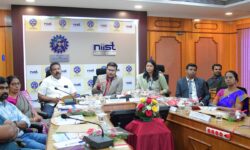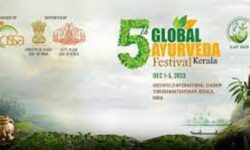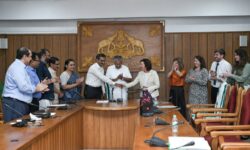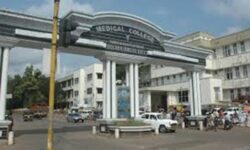KOCHI:
The 14th Asian Conference on Diarrhoeal Disease and Nutrition (ASCODD) will be hosted for the first time in Kerala this year, offering a platform to global experts to discuss and hammer out solutions for one of the world’s most urgent public health problems of diarrhoeal illness and malnutrition through innovative scientific research and healthcare delivery.
The three-day conference, which gets underway in Kochi on October 30 (Monday), is being organised by the Rajiv Gandhi Centre for Biotechnology, a national institute under the Department of Biotechnology, Govt. of India, in association with International Centre for Diarrhoeal Disease Research, Bangladesh (icddr,b); Translational Health Science and Technology Institute (THSTI), Faridabad; the INCLEN Trust International (INCLEN INT)and the National Institute of Cholera and Enteric Diseases (NICED), Kolkata. 
The October 30-November 1 conference, themed on “Saving lives: innovations and solutions for diarrhoeal diseases, enteric fever and malnutrition,” which is majorly supported by the Bill and Melinda Gates Foundation, will be held at the Crowne Plaza Hotel, Kochi.Over 60 scientists from countries, including the UK, the US, Bangladesh, Germany, India, France and Sweden, will present papers and lead discussions in 10 sessions spread over the three days. Special sessions will be held to deliberate on effective strategies and innovative technologies in diarrhoeal disease surveillance, vaccine research and other point of care diagnostics for enteric diseases.
“Diarrhoea is a killer, especially in children below the age of ten. Globally, it is the second leading cause of death among children,” noted Prof. M. Radhakrishna Pillai, the Organising Chair and Director of RGCB. “It also leads to stunting in affected children and makes them vulnerable to other diseases, as many develop malabsorption.”
He added: “Majority of the diarrhoeal pathogens are still not correctly diagnosed and are not a part of the national surveillance programme. However, there are a few top priority enteric pathogens for which surveillance n
etworks are functional.”
The scientific sessions will be particularly important as there are sessions that discuss the use of next generation sequencing that provides deeper insights into enteric pathogens genetics and diversity, said Prof. Pillai. “It is a very important part of research, which is developed in western countries and needs a boost in India. We have renowned experts like Prof. Gordon Dougan of the Wellcome Trust Sanger Institute, UK, and Prof. Lother. H. Weiler of Robert Koch Institute, Berlin elaborating on this,” he informed.
The ASCODD will also have a session on the regional experiences in the control of the diarrhoeal disease, covering how the disease burden is managed in Bangladesh, Nepal, Indonesia and India, with the first-hand experie
nce of scientists from these countries.
“We need larger research communities, optimal research funding, and capabilities for larger data handling as well as sharing of information between countries. We expect these things to be discussed in the conference,” he emphasized.
Dr. Sabu Thomas, Scientist in RGCB, said, “India experiences periodic outbreaks of both bacterial and viral pathogens. Transmission of these pathogens happens across the boundaries, and can be effected through travellers and the food chain. Hence, conferences such as these are vital to improve our scientific understanding about the burden of disease, molecular nature of the pathogen and modes of disease prevention.”
Dr. Thomas noted that there is definitely a need for neighbouring countries to develop a common surveillance system or network system to assess the presence of these pathogens and their genetic evolution.
He further stated that antimicrobial resistance (AMR) would be an exciting topic of discussion at the conference. “The major driver of the AMR today is the overuse of antibiotics; and it has become a serious concern worldwide, particularly in South Asia. The Government of India has already drafted a National Action Plan on the AMR, and the conference is expected to bring out more valuable ideas.”
During the conference, budding scientists will get an opportunity to present their papers in an exclusive session and there will be poster presentation of each session. Representatives from the WHO and the Indian Council of Medical Research (ICMR) will also attend.




